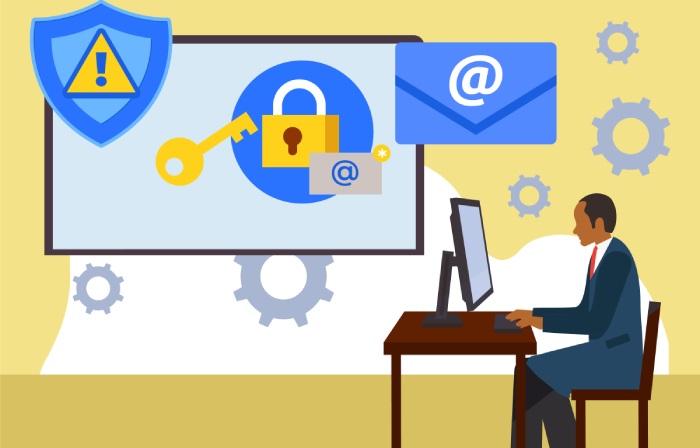Maintaining standards across the organization by managing things well is what everyone dreams of, but lacunae creep into the structure gradually. To overcome this issue, most organizations outsource their internal services to third-party vendors. Maintaining the business email infrastructure, including overall email management and email security, is such a service.
Organizations rely heavily on emails for any official communication. However, it has its challenges. Malicious actors have been intensifying their cyber world attacks, and their favorite conduit has remained emails. Here is an examination of whether it is recommended for a new business to outsource its email infrastructure to a third-party vendor or advisable to manage it in-house by looking at its pros and cons.
Advantages
The following are the advantages of outsourcing email infrastructure management over in-house management.
Access To Experts
The managed service providers are all adept at what they do. Third-party vendors have relevant experience within their ranks to supplement the effort of their clients. Hence, it is wise for new businesses to outsource their email infrastructure to such experienced hands.
Faster Turnaround
One of the biggest disadvantages to large organizations is internal bureaucracy. Decision-making can at times become hostage to layers of approvals and permissions. It leads to delays and loss of response time. A third-party vendor is solely focused on the given responsibility based on a comprehensive contract and will not need the clients’ approvals and permissions at every step. The faster the action is taken, the better will the security of the establishment be.
Focus On Core Responsibilities
Organizations whose core responsibilities and strengths lie elsewhere will not want to diminish it by excessive focus on tasks that are not their forte. For example, a manufacturing house will not want to have a team only looking after email security. They would rather have it outsourced to experts who can deal with it better. The organization will thus be able to focus on their given field of expertise more intently.
Sharing Of Risks
While well-established business organizations share responsibilities with third-party vendors, new businesses may not always have the resources to share risks. However, the advantage one gets by outsourcing email security is immense. One can share the prevalent risk and undertake mitigating actions in time.
Reduction Of Cost
Outsourcing email Infrastructure will lead to a reduction in costs. It is not merely for email security but every other associated responsibility too. An organization would have to undergo the process of recruitment and create a pay structure for personnel. The easier way out is to outsource the same to a managed service provider, who will take care of the entire paraphernalia. Only the core business will be looked after by the original enterprise.
Round-the-clock Maintenance
One of the most significant advantages of outsourcing email Infrastructure to a managed service provider is that it is no more limited to regular office hours. They will take care of it round the clock. Third-party vendors handle clients across disparate time zones and do not stick to one particular geographical constant. Hence, they can supervise the email infrastructure at all hours. It is an excellent advantage for any organization that wants to communicate with its clients across the globe. The round-the-clock management increases the deliverability of the emails.
Simplified Targets
Once part of the work is outsourced, there is less hassle to handle. The entire responsibility of that particular work will now lie squarely on the managed service provider’s shoulders. The organization’s target would boil down to its core strengths, where the focus would be more. It also provides greater peace of mind.
Scalability
Another significant factor that new businesses overlook is the big picture. Email infrastructure for the initial workload might be manageable. But when the email load increases to a few thousand, the strain starts appearing. Outsourcing email infrastructure is the correct way to scale the domain. Scalability is the prime concern of every new business. Without expansion, an organization stagnates and withers. Email infrastructures often undergo outages and downtimes. The third-party vendor will efficiently handle such incidents. As discussed in an earlier point, the response time will be much shorter compared to in-house teams.
Disadvantages
Nothing is without its downsides. And here are the ones for outsourced email management.
Loss Of Control
Once the responsibility is outsourced, there will be an inevitable loss of control. However, to overcome the issue, there are legalities and Service Level Agreements, which will be in place.
Presence Of Hidden Costs
In-house teams will not have hidden costs, but third-party vendors may add them during the contract. It is one of the significant pitfalls of outsourcing responsibilities. The cost rise may be sudden and dramatic at times, which is why it is crucial to assess the vendor’s transparency beforehand.
Security Risks
While managed service providers are experts in their field and professionals, letting others handle business emails is always fraught with danger. It needs to be considered while looking for third-party participation. Email security is a prime concern and will be the most critical driver for the partnership.
Unstable Quality Control
While in-house management might have maintained the organization’s standard quality norms, third-party teams might not provide the same. The usual way to counter this is to have Service Level Agreements, which will define quality standards. Also, standardized services such as Email-as-a-Service could solve such issues to a significant extent.
Improper Time Lines
Some third-parties might not be able to provide adequate cover as had been expected or as per agreement. Organizations with global reach work round the clock and will need 24×7 support. Failure to do so may lead to email security issues. There is always a cybersecurity threat looming somewhere.
Shifting Of Focus
The primary reason to outsource the email infrastructure would be to attain a complete focus on the core strengths. However, too many managed service providers managing the affairs may lead to a loss of focus.
Final Words
New Businesses would need to scale fast to survive the intensely competitive world of technology. Third-party intervention for email infrastructure management is always welcome if it helps the organization retain control over its core strengths. The emerging technologies that are slowly making their presence felt are here to stay and, with more sophistication, will require more significant expertise and commitment. This area is where external experts play a significant role.


